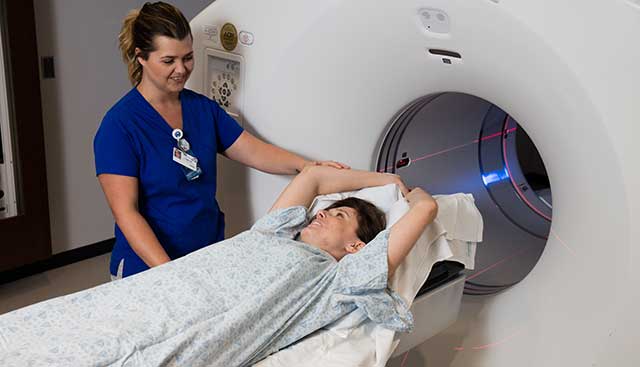Neuroendocrine Tumor Treatment Information

A neuroendocrine tumor is a type of cancer that forms in specialized cells that produce and release hormones into the bloodstream in response to messages received from the body's nervous system.
Neuroendocrine tumors often originate in the gastrointestinal tract, pancreas and lungs. When neuroendocrine tumors metastasize, they frequently spread to the liver, among other organs. Neuroendocrine tumors can produce hormones, such as serotonin, resulting in symptoms such as diarrhea or facial flushing.
Pancreatic neuroendocrine tumors may, rarely, be hereditary, and associated with syndromes such as Multiple Endocrine Neoplasia type 1 (MEN1). However, most neuroendocrine tumors have no known genetic or environmental causes.
While many neuroendocrine tumors are relatively slow growing, some can be quite aggressive. Tumor differentiation and grade help characterize aggressiveness. High-grade tumors tend to grow rapidly. Poorly-differentiated neuroendocrine carcinomas are biologically distinct from well-differentiated neuroendocrine tumors, and are particularly fast-growing cancers.
Many neuroendocrine tumors are discovered as a result of symptoms arising from either tumor growth or hormone production. Sometimes, neuroendocrine tumors are discovered incidentally. The behavior of small, superficial and low-grade neuroendocrine tumors can be fairly benign, depending on tumor location. For example, small, well-differentiated neuroendocrine tumors of the appendix or rectum rarely spread. Neuroendocrine tumors of the stomach can arise from a condition called atrophic gastritis. These tumors also tend to behave in a relatively benign fashion.
What are the symptoms of a neuroendocrine tumor?
Neuroendocrine tumors tend to be small and slow-growing, and they are often silent in their earliest stages. When symptoms develop, they can vary depending on the location of the tumor and whether it produces excess hormones. Possible signs can include:
- Pain or a sensation of fullness in the stomach
- Unusual fatigue
- Unintended weight loss
- Skin rashes and facial flushing
- Wheezing and shortness of breath
- Swelling in the feet and ankles
- Diarrhea
- Dizziness and shakiness
How is a neuroendocrine tumor diagnosed?
 If a neuroendocrine tumor is suspected, a physician will typically perform a series of diagnostic tests, which may include:
If a neuroendocrine tumor is suspected, a physician will typically perform a series of diagnostic tests, which may include:
- A physical examination and a medical history review
- Lab testing, such as a urine test and bloodwork
- Imaging scans, such as X-rays, ultrasounds, computed tomography (CT) scans, magnetic resonance imaging (MRI) scans and positron emission tomography (PET) scans with a radioactive tracer injected into a vein
- A biopsy, which involves collecting a small sample of suspicious cells for analysis by a pathologist for evidence of cancer
How are neuroendocrine tumors treated?
Neuroendocrine tumor treatment can vary depending on multiple factors, such as the size, type, and location of the tumor and whether it is producing excess hormones or affecting certain organs. Many patients elect to receive a combination of treatments, which may include:
- Surgery – In many cases, a resection is performed to remove as much of the tumor as possible along with a margin of surrounding healthy tissue. Some possible alternatives to a traditional surgical procedure include microwave ablation, which can destroy cancerous cells without physically removing them from the patient’s body.
- Somatostatin analogs – These analogs of the nature hormone somatostatin help to reduce hormonal secretion of neuroendocrine tumors and inhibit tumor growth.
- Chemotherapy – After being delivered intravenously or orally, powerful cancer-fighting medications can enter the bloodstream and travel throughout the body to target and destroy widespread cancer cells. Neuroendocrine tumors that are frequently treated with chemotherapy include poorly-differentiated neuroendocrine carcinomas, and pancreatic neuroendocrine tumors.
- Targeted therapy – A cornerstone of precision cancer medicine, targeted drug treatments focus on precise genes and proteins found in neuroendocrine tumors that help the cancer cells grow, divide and spread. By interfering with these specific molecular targets, targeted therapies can be effective in destroying cancer cells while sparing healthy cells.
- Peptide receptor radionuclide therapy (PRRT) – Administered intravenously, PRRT combines a drug that targets cancer cells with a small amount of a radioactive substance, allowing the radiation to be delivered directly to a tumor.
- Radiation therapy – A linear accelerator can be used to generate high-energy beams, such as X-rays and protons, to destroy cancerous cells. Located outside the patient’s body, the linear accelerator can be programmed to target the powerful beams directly at a tumor.
Benefit from the latest treatment options at Moffitt Cancer Center
Moffitt Cancer Center takes a unique and collective approach to neuroendocrine tumor treatment. The multispecialty team in our renowned Gastrointestinal Oncology Program brings together a group of highly specialized oncologists who work collaboratively to develop individualized treatment plans to meet the precise needs of our patients. We are proud to offer the latest options in neuroendocrine tumor treatment, including promising new therapies available only through our robust clinical trials program.
Our neuroendocrine tumor team closely monitors the progress of each patient, adjusting and fine-tuning his or her treatment as appropriate. We also have a tumor board that meets regularly to review complex cases and exchange ideas. At Moffitt, we treat more than cancer—we treat people. Ultimately, our goal is to help each patient achieve the best possible outcome and quality of life.
Your cancer diagnosis is a top priority of the multispecialty team at Moffitt. If you are interested in exploring your neuroendocrine tumor treatment options with a specialist, you can rapidly connect with an experienced oncologist at Moffitt by calling 1-888-663-3488 or completing our new patient registration form online. We will help you get started on a personalized treatment plan right away, then support you with compassionate care throughout your journey to better health.
